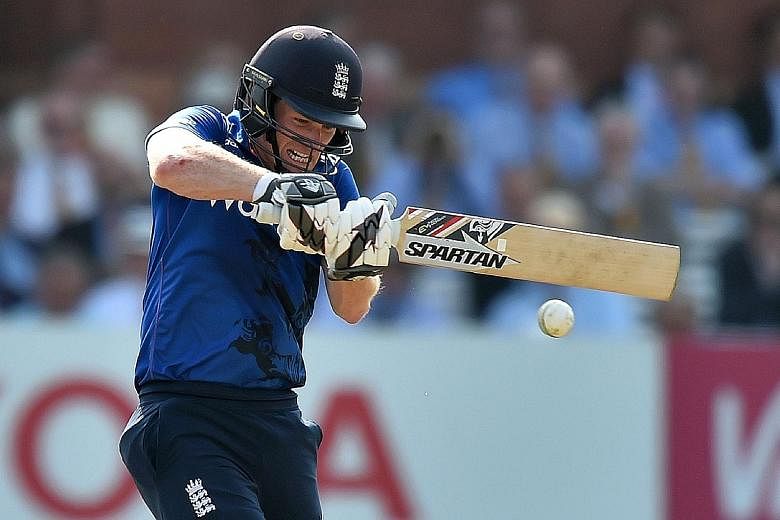Lest we forget, sports players are human beings.
Two stories this week illustrate that, for very different reasons. One became world headlines when Eoin Morgan, the captain of England's one-day cricket team, opted not to go to Bangladesh later this month because of fears following the ISIS terrorist slaughter of people having a Friday night meal in Dhaka last July.
The other, somewhat quieter story, concerns four Manchester United players turning up at the home of a 73-year-old man whose last wish was to meet some of the team he had supported all his life.
The players - Ashley Young, Marcus Rashford, Jesse Lingard and Timothy Fosu-Mensah - responded to a Facebook plea by the granddaughter of Paddy Lawler. It seems Lingard's cousin saw the appeal and the players drove round to Lawler's home a few kilometres away after training on Tuesday.
Lawler passed away less than an hour after their visit. He had terminal cancer, and when his granddaughter, Kayleigh, asked if there was anything he would like to do before his time came, his answer was to meet the team.
The wish granted, Lawler was dressed in a United shirt when the boys called on him. "Top lads, all four of them," Kayleigh posted later. "Thanks so much to everyone who helped. Sure granddad's over the moon."
 Irish-born Eoin Morgan, the captain of England's one-day and Twenty20 cricket teams, has been stridently criticised in some quarters for pulling out of the forthcoming tour of Bangladesh because of security concerns. PHOTO: AGENCE FRANCE-PRESSE
Irish-born Eoin Morgan, the captain of England's one-day and Twenty20 cricket teams, has been stridently criticised in some quarters for pulling out of the forthcoming tour of Bangladesh because of security concerns. PHOTO: AGENCE FRANCE-PRESSE
The players seemed to talk naturally and comfortably to a stranger whom they knew only because of the message on Facebook - and who was almost beyond acknowledging them.
The granddaughter used the word selfless in thanking them. Quite rightly we do not know how the United players, particularly the teenagers Rashford and Fosu-Mensah, coped with seeing impending death.
Selfless is the right adjective. And in a way something done outside the spotlight they live in deserves simply to be admired and not pried into any further.
Shouldn't we afford Eoin Morgan the same respect? Apparently, not a chance, not in the modern media world where everyone and anyone has an opinion.
Morgan, 30, is an Irishman born in Dublin who nevertheless progressed to lead England's one-day and Twenty20 national cricket teams.
All 15 players, and the coaching and support staff, invited to fly out to Bangladesh on Sept 30, were assured that the decision on whether to go or not was up to them.
They were told that it was safe for them to travel (though England's supporters known as the Barmy Army were not given such guarantees and will not be there on any organised basis).
The players were also assured that there would be no repercussions regarding future selection for anyone who chose not to tour. Two individuals, Morgan and the batsman Alex Hales are the only players to opt out of this or the Test team that follows them in the second half of October.
Few blame Hales, but many make an exception for Morgan.
Why? Because he is captain. Alastair Cook, the skipper of the Test side, has agreed to tour, although he will fly home for the birth of his second child before the first Test starts.
"Alastair Cook showed guts and determination and leadership," tweeted journalist and broadcaster Piers Morgan who, despite sharing a surname, has no connection with Eoin Morgan.
No connection, and no respect. Piers Morgan, to put it mildly, makes a name for himself by being critical of others.
"Eoin Morgan," he tweeted, "bottled it. Pathetic. Staggering lack of courage and leadership. Should have England captaincy stripped asap."
Morgan, the opinionator, probably has no more insight into Morgan, the cricketer, than the rest of the media.
Eoin Morgan is very much his own man. He guards his personal life jealously, he courts no publicity, he answers to no one on why, for example, he does not sing the British national anthem before tournaments.
He was given the captaincy of the one-day team when it was stripped from Cook two years ago. And there has been a remarkable transformation in the approach, and the results, since Morgan took on the mantle.
The shorter form of the game is played at a different tempo, and in a bolder fashion, to the drawn-out wiles of Test cricket. To each his own, the two captains are firing England in the different formats.
That is not the issue. Andrew Strauss, the former Test captain who now acts as team director, took the not uncommon decision to select different skippers for the two forms of the game.
Strauss consulted with the players before the tour following last year's siege at the Holey Artisan Bakery cafe in Dhaka where terrorists hacked nine Italian, seven Japanese, one United States citizen and one Indian to death before being shot dead themselves.
What followed was the same depressing consideration that follows every sports event since the Black September murders of Israelis at the 1972 Munich Olympics through to the recent Euro 2016 football tournament in France.
Security is no longer a guarantee for any of us, anywhere, at any time. We make our own choices when called upon.
Strauss received assurances from Reg Dickason, the trusted head of security for the English Cricket Board, that the players and coaching staff could be secured.
This probably means armed guards outside their bedrooms, armed escorts wherever they journey, and intrusive surveillance in and around their lives.
The Foreign and Commonwealth Office advice to the fans is different. It speaks of heightened threat of further terrorist attack in Bangladesh (the same as in London or currently in so many places).
Cricketers such as Stuart Broad say they have known Reg Dickason for a very long time and trust his assurances.
Broad was in India during the 2008 Mumbai attacks on the hotel where England's cricketers were due to stay. Eoin Morgan has twice been unnerved, by a bomb blast in Bengaluru, India, when he played there in 2010, and by violence related to the general election when he previously played in Bangladesh.
He exercised his personal right not to go this time. But because he was the leader, the brave men of the media and former captains of England, accuse him now, in effect, of cowardice.


